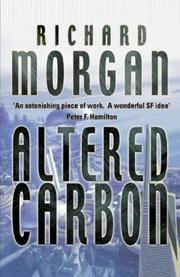 This novel is a fine example of a 'transhuman' future, where human consciousness can be downloaded into another body, stored in machines or transmitted across networks.The entertaining twist to this book is that it blends hard science fiction with crime noir, creating a dystopian and disorienting future anchored in the tradition of Philip K. Dick, where fluid concepts of human identity are played with to dark and at times grimly humorous effect.
This novel is a fine example of a 'transhuman' future, where human consciousness can be downloaded into another body, stored in machines or transmitted across networks.The entertaining twist to this book is that it blends hard science fiction with crime noir, creating a dystopian and disorienting future anchored in the tradition of Philip K. Dick, where fluid concepts of human identity are played with to dark and at times grimly humorous effect.Like any good murder mystery, the plot twists and turns, an effect multiplied when you are confronted with situations only sci-fi can deliver. The novel opens with military envoy Takeshi Kovacs being killed in an operation on another planet, only to discover soon after that his consciousness (backed up in a "stack" at the top of his spine) has been "needlecast" across space into a new body in San Francisco to investigate the apparent suicide of a wealthy man. The suicide victim is also back from the dead, enjoying life again in a new body of his choice. Kovacs, however, has been given the body (or "sleeve") of a policeman, whose consciousness is being held in a digital prison as punishment for a previous crime. Just to complicate matters, the policeman’s girlfriend is still on the scene. And so on.
Richard Morgan blends sci-fi jargon and mean-streets sensibility very well. The characters are all fairly hard-bitten, although (reminiscent of Raymond Chandler) there are always decent men and women who need protecting and whose values and aspirations are worth fighting for. Some of the best writing is description of people coming to terms with their new bodies or adjusting to the overwhelming array of chemicals that circulate through their "sleeves" to enhance their senses. Kovacs struggles with the questions of identity that these technologies present. What constitutes a person when they can swap bodies so readily? How will the justice system deal with mere crimes upon the body, when the consciousness can escape unscathed? Can the state bring a Catholic back from the dead to testify in a murder trial, against their religious convictions that state strictly no `re-sleeving’?
I found myself fully immersed in the bizarre experiences that Takeshi Kovacs endures:
"As I dressed in the mirror that night, I suffered the hard-edged conviction that someone else was wearing my sleeve and that I had been reduced to the role of a passenger in the observation car behind the eyes"
It is a future rendered truly unsettling and perhaps a little prescient, which makes good science fiction so compelling. Yet, as in all good stories, humanity's finer instincts are never fully extinguished, even in the in the strange and mean streets of this future LA. Recommended for those who like crime fiction but have never thought to try SF.


No comments:
Post a Comment